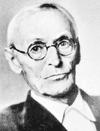- Hesse, Hermann
-
died Aug. 9, 1962, Montagnola, Switz.German novelist and poet.He left the seminary because of his inability to adapt to the life there. His first novel was Peter Camenzind (1904); it was followed by Beneath the Wheel (1906), Gertrud (1910), and Rosshalde (1914). An opponent of militarism, he settled permanently in Switzerland at the outbreak of World War I (1914–18). His later works deal with the individual's search for spiritual fulfillment, often through mysticism. Demian (1919), influenced by his experience with psychoanalysis, made him famous. Siddhartha (1922), about the early life of Buddha, reflects his interest in Eastern spiritualism. Steppenwolf (1927), which examines the conflict between bourgeois acceptance and spiritual self-realization, was highly influential in its time and brought him cult status among the young of more than one generation. Narcissus and Goldmund (1930) and The Glass Bead Game (1943; also published as Magister Ludi) concern duality and the conflict between the contemplative and the active life. He won the Nobel Prize for Literature in 1946. His mysticism and his interest in self-realization kept him popular long after his death.
 Hermann Hesse, 1957.Wide World Photos
Hermann Hesse, 1957.Wide World Photos* * *
▪ German writerborn July 2, 1877, Calw, Ger.died Aug. 9, 1962, Montagnola, Switz.German novelist, poet, and winner of the Nobel Prize for Literature in 1946, whose main theme deals with man's breaking out of the established modes of civilization to find his essential spirit. With his appeal for self-realization and his celebration of Eastern mysticism, Hesse posthumously became a cult figure to young people in the English-speaking world.At the behest of his father, Hesse entered the Maulbronn seminary. Though a model student, he was unable to adapt, so he was apprenticed in a Calw tower-clock factory and later in a Tübingen bookstore. His disgust with conventional schooling was expressed in the novel Unterm Rad (1906; Beneath the Wheel), in which an overly diligent student is driven to self-destruction.Hesse remained in the bookselling business until 1904, when he became a free-lance writer and brought out his first novel, Peter Camenzind, about a failed and dissipated writer. The inward and outward search of the artist is further explored in Gertrud (1910) and Rosshalde (1914). A visit to India in these years was later reflected in Siddhartha (1922), a lyric novel based on the early life of Buddha.During World War I, Hesse lived in neutral Switzerland, wrote denunciations of militarism and nationalism, and edited a journal for German war prisoners and internees. He became a permanent resident of Switzerland in 1919 and a citizen in 1923, settling in Montagnola.A deepening sense of personal crisis led Hesse to psychoanalysis with J.B. Lang, a disciple of Carl Gustav Jung (Jung, Carl). The influence of analysis appears in Demian (1919), an examination of the achievement of self-awareness by a troubled adolescent. This novel had a pervasive effect on a troubled Germany and made its author famous. Hesse's later work shows his interest in Jungian concepts of introversion and extroversion, the collective unconscious, idealism, and symbols. The duality of man's nature preoccupied Hesse throughout the rest of his career.Der Steppenwolf (1927; Steppenwolf ) describes the conflict between bourgeois acceptance and spiritual self-realization in a middle-aged man. In Narziss und Goldmund (1930; Narcissus and Goldmund), an intellectual ascetic who is content with established religious faith is contrasted with an artistic sensualist pursuing his own form of salvation. In his last and longest novel, Das Glasperlenspiel (1943; English titles The Glass Bead Game, or Magister Ludi), Hesse again explores the dualism of the contemplative and the active life, this time through the figure of a supremely gifted intellectual.Additional ReadingSoul of the Age, ed. by Theodore Ziolkowski (1991), contains an extensive selection of Hesse's letters in translation. Biography and criticism may be found in G.W. Field, Hermann Hesse (1970); Joseph Mileck, Hermann Hesse: Biography and Bibliography, 2 vol. (1977), Hermann Hesse: Life and Art (1978); and Ralph Freedman, Hermann Hesse, Pilgrim of Crisis: A Biography (1978, reissued 1997).* * *
Universalium. 2010.
